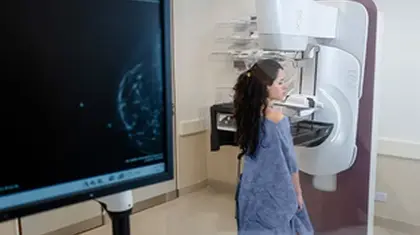- Ulcerative colitis is a type of inflammatory bowel disease (IBD) that causes inflammation of the colon, and leads to symptoms such as fatigue, abdominal pain, and cramping.
- There is currently no cure for ulcerative colitis, and not all people respond to currently available treatments.
- Results of the recent LUCENT-3 study found that many study participants who achieved clinical remission after 1 year of treatment continued their remission after 4 years.
- They also experienced other improvements such as improvements in bowel urgency.
In 2023, researchers estimated that about 5 million people around the world were living with ulcerative colitis — a type of inflammatory bowel disease (IBD) causing inflammation of the digestive system’s large intestine, or colon.
There is currently no cure for ulcerative colitis. Disease symptoms are treated and managed through different types of medications, lifestyle changes, and surgery as needed.
“We have made a great deal of progress in providing new mechanisms of action to treat ulcerative colitis in the last 5 years,” Bruce Sands, MD, MS, Dr. Burrill B. Crohn Professor of Medicine and chief of the Dr. Henry D. Janowitz, Division of Gastroenterology at the Icahn School of Medicine at Mount Sinai, told Medical News Today.
“Despite that, the majority of patients do not achieve clinical remission in response to therapy, and even when they do, there is a high likelihood that they will lose their response over the many years in which they require treatment,“ Sands explained. “This is particularly problematic for patients who have already failed other therapies, especially TNF inhibitors.”
Sands is the leading clinical investigator of the LUCENT-3 study, which provided more data regarding the use of
Within the results of the study, which were recently presented at United European Gastroenterology (UEG) Week, researchers found that many study participants who achieved clinical remission after 1 one year of treatment not only continued their remission after 4 years, but also experienced other improvements such as in bowel urgency.
The study findings are yet to appear in a peer-reviewed journal.
LUCENT-3 is a phase 3 extension trial of the original LUCENT-1 and LUCENT-2 trials that first evaluated efficacy and safety of mirikizumab in 1,279 adults with moderately to severely active ulcerative colitis.
In LUCENT-3, study participants’ safety and efficacy was evaluated for another three years of treatment, for a total of four years.
“Mirikizumab is an antibody that binds very specifically to a protein called interleukin-23,” Sands explained about how the drug worked. “Interleukin-23 is an important molecule that amplifies inflammation in ulcerative colitis. By blocking IL-23, the inflammation subsides and the bowel can heal, alleviating the symptoms of ulcerative colitis.”
The Food & Drug Administration (FDA) approved the use of Omvoh for the treatment of moderately to severely active ulcerative colitis in adults in 2023.
At the conclusion of the LUCENT-3 trial, researchers found that of study participants taking Omvoh who achieved clinical remission of their ulcerative colitis at 1 year during the phase 3 LUCENT-2 trial, 78% achieved both corticosteroid-free clinical remission and long-term clinical remission after 4 years of total treatment.
“These findings demonstrate the high likelihood of durability of clinical remission with mirikizumab treatment. That is, if a patient has achieved clinical remission at 1 year of treatment, this is very likely to persist. This provides patients and their doctors with confidence that once the treatment has worked, they will continue to do well over long periods of time.”
– Bruce Sands, MD, MS
Additionally, of these same participants, 93% reached a three or more point reduction on their Urgency Numeric Rating Scale (UNRS), which measures bowel urgency severity, and 74% hit a URNS of zero or one.
As many as 81% of study participants sustained endoscopic remission, defined as an endoscopic subscore of zero or one.
“We know that the key to continuing to feel well over long periods of time is to be able to heal the lining of the bowel,” Sands said. “These results show that patients who achieve endoscopic improvement will continue to maintain healing, which explains the excellent long term control of symptoms.”
MNT had the opportunity to speak with Ashwin N. Ananthakrishnan, MD, MPH, director of the Mass General Hospital Crohn’s and Colitis Center, and associate professor of medicine at Harvard Medical School, about this study.
Ananthakrishnan, who was not involved in this trial, commented that this is important data to have.
“Most initial clinical trials describe outcomes only up to 1 year but for chronic diseases like ulcerative colitis, it is important to know not just how well treatments work at 3 months or 1 year, but over a much longer period,” Ananthakrishnan explained.
“In addition, certain side effects may become apparent only after prolonged use. These long-term studies are particularly important to understand the safety of treatments as well,” he told us.
Ananthakrishnan said it is important for researchers to continue to find new ways of treating ulcerative colitis as up to one in five patients will have no response to a specific treatment, and another 30-40% may lose response over time.
“As most people are diagnosed in their 20s and 30s and are expected to survive well into their 70s and 80s with these diagnoses, patients will increasingly face a scenario where their current medication may not be effective even if they had an initial response,” he added. “Thus newer treatments are always an important need of the field.”
MNT also spoke to Rudolph Bedford, MD, board-certified gastroenterologist at Providence Saint John’s Health Center in Santa Monica, CA, about this research.
Bedford, who was likewise not involved in the study, commented that it was good to see that there is long-term data that proves the drug’s efficacy in treating patients with good tolerance and low adverse effects.
“Ulcerative colitis affects millions of people worldwide and typically strikes in very early adulthood, and so decades of disease are really at stake,” he explained. “It does have a severe impact on the quality of life — there are a variety of serious complications related to ulcerative colitis.”
“And despite the fact that we have many treatments, we still have not gotten to the point where everything really works well,” Bedford added. “Even with the treatments we have, patients tend to stop responding over a period of time. So it’s good to see long-term data such as this, knowing that at least you have well over a two-year efficacy, safety and ability to control disease itself.”






